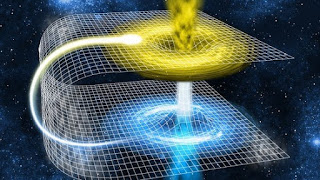If you read one article about worm holes Read this one
A wormhole is a theoretical passage through space-time that could create shortcuts for long journeys across the universe. Wormholes are predicted by the theory of general relativity. But be wary: wormholes bring with them the dangers of sudden collapse, high radiation and dangerous contact with exotic matter.
Wormholes were first theorized in 1916, though that wasn't what they were called at the time. While reviewing another physicist's solution to the equations in Albert Einstein's theory of general relativity, Austrian physicist Ludwig Flamm realized another solution was possible. He described a "white hole," a theoretical time reversal of a black hole. Entrances to both black and white holes could be connected by a space-time conduit.
In 1935, Einstein and physicist Nathan Rosen used the theory of general relativity to elaborate on the idea, proposing the existence of "bridges" through space-time. These bridges connect two different points in space-time, theoretically creating a shortcut that could reduce travel time and distance. The shortcuts came to be called Einstein-Rosen bridges, or wormholes.
Science fiction is filled with tales of traveling through wormholes. But the reality of such travel is more complicated, and not just because we've yet to spot one.
The first problem is size. Primordial wormholes are predicted to exist on microscopic levels, about 10–33centimeters. However, as the universe expands, it is possible that some may have been stretched to larger sizes.
Another problem comes from stability. The predicted Einstein-Rosen wormholes would be useless for travel because they collapse quickly.
"You would need some very exotic type of matter in order to stabilize a wormhole," said Hsu, "and it's not clear whether such matter exists in the universe."
Today's technology is insufficient to enlarge or stabilize wormholes, even if they could be found. However, scientists continue to explore the concept as a method of space travel with the hope that technology will eventually be able to utilize them.
"You would need some of super-super-advanced technology," Hsu said. "Humans won't be doing this any time in the near future."
Stephen Hawking on worm holes, check this out.
Check out more on worm holes, subscribe our blog for more content........




Comments